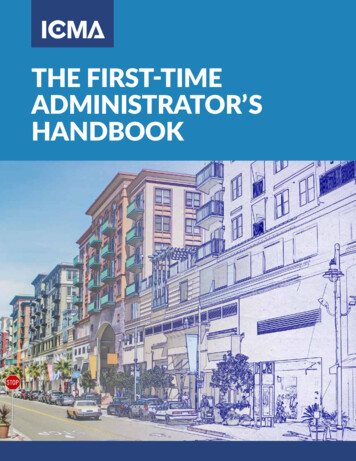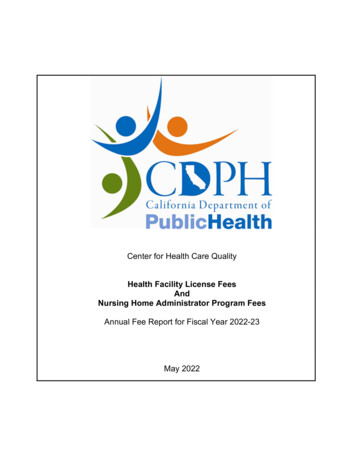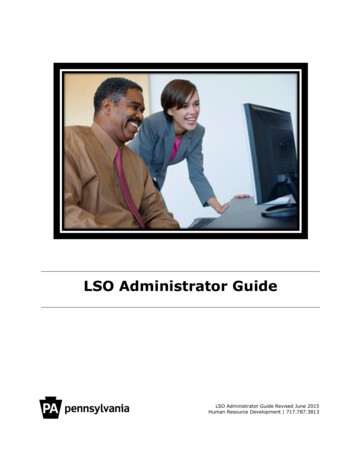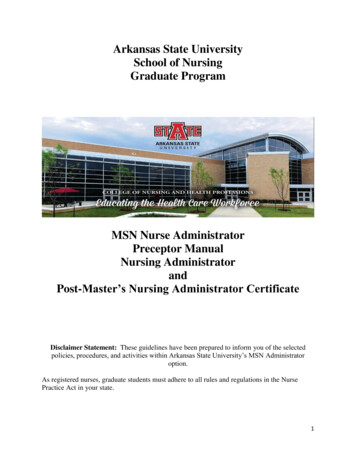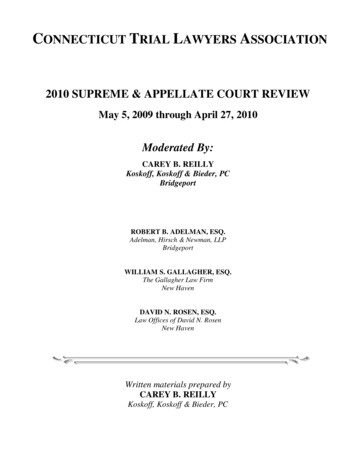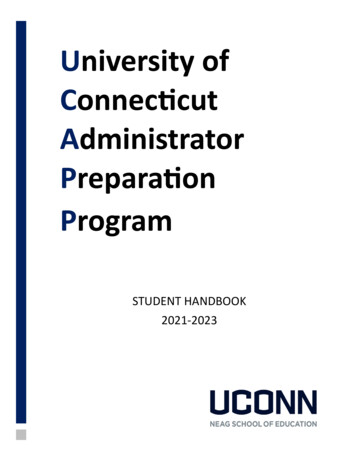
Transcription
University T HANDBOOK2021-2023
PROGRAM CONTACTSDr. Laura BurtonDepartment HeadLaura.Burton@uconn.eduDr. Richard GonzalesDirector, Educational Leadership Preparation ProgramsRichard.Gonzales@uconn.eduErin MurrayCoordinator, UCAPPErin.Murray@uconn.eduKimberly ShirshacProgram AssistantKimberly.Shirshac@uconn.eduDepartment of Educational LeadershipNeag School of EducationUniversity of Connecticut249 Glenbrook Road, Unit 3093Storrs, CT 06269-3093Office: (860) 486 - 0240Fax: (860) 486 - 40282
TABLE OF CONTENTSPROGRAM CONTACTS . 2TABLE OF CONTENTS .3MISSION AND EQUITY COMMITMENT .4LEADERSHIP STANDARDS - CONNECTICUT . 5PROGRAM OVERVIEW .8COMPETENCIES .11COURSE DESCRIPTIONS. ERROR! BOOKMARK NOT DEFINED.INTERNSHIP .15ASSESSMENTS.22UNIVERSITY AND PROGRAM POLICIES . 24CONNECTICUT CERTIFICATION REQUIREMENTS . 303
MISSION AND EQUITY COMMITMENTNeag School MissionOur mission is to improve educational and social systems to be more effective, equitable, and justfor all. We develop educators, professionals, and scholars; conduct rigorous and relevantresearch; and engage in reciprocal and responsible partnerships with students, practitioners,policymakers, and community members in Connecticut and around the world.UCAPP MissionThe mission of the University of Connecticut Administrator Preparation Program (UCAPP) is toprepare highly qualified and capable school leaders who are committed to realizing excellenceand equity in all Connecticut schools.Equity CommitmentUCAPP is committed to developing and preparing transformational school leaders with thecompetence and disposition to effect school policies and practices that realize equitableachievement, participation, service, and support outcomes for every student.Through strategically aligned coursework and practicum experiences, UCAPP graduates will: Lead with an anti-racist and equity driven perspective Lead by listening to and working collaboratively with all constituencies -- teachers,students, families, and communities -- which they serve Lead with honesty and courage to confront and disrupt systemic policies and practiceswhich have perpetuated disparate achievement, participation, service, and supportoutcomes4
LEADERSHIP STANDARDS - CONNECTICUTConnecticut School Leadership StandardsPERFORMANCE EXPECTATION 1: Vision, Mission, and GoalsEducation leaders ensure the success and achievement of all students by guiding the development andimplementation of a shared vision of learning, a strong organizational mission, and high expectations forstudent performance.Element A. High Expectations for All: Leaders ensure that the creation of the vision, mission and goalsestablish high expectations for all students and staff.Element B. Shared Commitments to Implement the Vision, Mission, and Goals: Leaders ensure thatthe process of implementing and sustaining the vision, mission, and goals is inclusive, building commonunderstandings and commitment among all stakeholders.Element C. Continuous Improvement toward the Vision, Mission, and Goals: Leaders ensure thesuccess and achievement of all students by consistently monitoring and refining the implementation ofthe vision, mission and goals.PERFORMANCE EXPECTATION 2: Teaching and LearningEducation leaders ensure the success and achievement of all students by monitoring and continuouslyimproving teaching and learning.Element A. Strong Professional Culture: Leaders develop a strong professional culture which leads toquality instruction focused on student learning and the strengthening of professional competencies.Element B. Curriculum and Instruction: Leaders understand and expect faculty to plan, implement, andevaluate standards-based curriculum and challenging instruction aligned with Connecticut and nationalstandards.Element C. Assessment and Accountability: Leaders use assessments, data systems, and accountabilitystrategies to improve achievement, monitor and evaluate progress, and close achievement gaps.PERFORMANCE EXPECTATION 3: Organizational Systems and SafetyEducation leaders ensure the success and achievement of all students by managing organizationalsystems and resources for a safe, high-performing learning environment.Element A. Welfare and Safety of Students, Faculty and Staff: Leaders ensure a safe environment byaddressing real and potential challenges to the physical and emotional safety and security of students,faculty and staff.Element B. Operational Systems: Leaders distribute responsibilities and supervise managementstructures and practices to improve teaching and learning.Element C. Fiscal and Human Resources: Leaders establish an infrastructure for finance and personnelthat operates in support of teaching and learning.5
PERFORMANCE EXPECTATION 4: Families and StakeholdersEducation leaders ensure the success and achievement of all students by collaborating with families andother stakeholders to respond to diverse community interests and needs and to mobilize communityresources.Element A. Collaboration with Families and Community Members: Leaders ensure the success of allstudents by collaborating with families and other stakeholders.Element B. Community Interests and Needs: Leaders respond and contribute to community interestsand needs to provide high quality education for students and their families.Element C. Community Resources: Leaders access resources shared among schools, districts, andcommunities in conjunction with other organizations and agencies that provide critical resources forchildren and families.PERFORMANCE EXPECTATION 5: Ethics and IntegrityEducation leaders ensure the success and achievement of all students and staff by modeling ethicalbehavior and integrity.Element A. Ethical and Legal Standards of the Profession: Leaders demonstrate ethical and legalbehavior.Element B. Personal Values and Beliefs: Leaders demonstrate a commitment to values, beliefs, andpractices aligned with the vision, mission and goals for student learning.Element C. High Standards for Self and Others: Leaders model and expect exemplary practices forpersonal and organizational performance, ensuring accountability for high standards of studentlearning.PERFORMANCE EXPECTATION 6: The Education SystemEducation leaders ensure the success and achievement of all students and advocate for their students,faculty and staff needs by influencing social, cultural, economic, legal, and political contexts affectingeducation.Element A. Professional Influence: Leaders improve the broader social, cultural economic, legal, andpolitical, contexts of education for all students and families.Element B. The Educational Policy Environment: Leaders uphold and contribute to policies and politicalsupport for excellence and equity in education.Element C. Policy Engagement: Leaders engage policymakers to inform and improve education policy.6
National Professional Standards for Educational Leaders (PSEL)Standard 1: Effective educational leaders develop, advocate, and enact a sharedmission, vision, and core values of high-quality education and academic success and well-beingof each student.Standard 2: Effective educational leaders act ethically and according to professionalnorms to promote each student’s academic success and well-being.Standard 3: Effective educational leaders strive for equity of educational opportunityand culturally responsive practices to promote each student’s academic success and well-being.Standard 4: Effective educational leaders develop and support intellectually rigorousand coherent systems of curriculum, instruction, and assessment to promote each student’sacademic success and well-being.Standard 5: Effective educational leaders cultivate an inclusive, caring, and supportiveschool community that promotes the academic success and well-being of each student.Standard 6: Effective educational leaders develop the professional capacity andpractice of school personnel to promote each student’s academic success and well-being.Standard 7: Effective educational leaders foster a professional community of teachersand other professional staff to promote each student’s academic success and well-being.Standard 8: Effective educational leaders engage families and the community inmeaningful, reciprocal, and mutually beneficial ways to promote each student’s academicsuccess and well-being.Standard 9: Effective educational leaders manage school operations and resources topromote each student’s academic success and well-being.Standard 10: Effective educational leaders act as agents of continuous improvement to promoteeach student’s academic success and well-being.7
PROGRAM OVERVIEWProgram of StudyYear 1SequenceSummer 1Focus:PrincipalshipUCAPP 3.0Core AssessmentsUCAPP 3.0 Course DescriptionsEDLR 5401 – Principalship &Administration of EducationalOrganizations (2)EDLR 5402: Human Development forSchool Leaders (2)Year 1FallFocus:Classroom &IndividualsEDLR 5403: Instructional Leadership- Systems & Structures to SupportHigh-quality Curriculum, Instruction,& Assessment (2)EDLR 5404: OrganizationalLeadership – Culture, Family, &Community Engagement (2)EDLR 5092 – Practicum:Administrative Field Experience (1)InternshipEssential ExperiencesIndividual Leadership Plan:Standards-based personalized plan for leadershiplearningFall Year 1Spring Year 1Org Diagnosis (OL):InstructionalSupervision Cycle(TM):Analysis of achievementand culture to identifypriorities forimprovementAssess teacherperformance and providefeedback for improvement Gather and analyze data Audit schedule(s) Examine improvementplans Conduct walkthroughs Take stock of existinginitiatives Understand studentsupport structures &processes Observe lesson(s)SpringEDLR 5405: Instructional Leadership– Curriculum & Assessment (2)EDLR 5406: Talent Management –Supervision & PerformanceEvaluation (2)EDLR 5092 – Practicum:Administrative Field Experience (1)8
Year 2SequenceSummer 2UCAPP 3.0 Course DescriptionsUCAPP 3.0InternshipCore AssessmentsEssentialExperiencesEDLR 5407: Contemporary Educational Policy (2)Focus:Policies &InclusiveSchoolsEDLR 5408: Leadership for Special Populations (3)Year 2FallFall -Fall/Spring –EDLR 5409: Organizational Leadership –Improving Educational Organizations (2)Year 2Year ement(Change)Project:Supportprofessionallearning forschool, team, orgroupLead stakeholdersin a schoolimprovementinitiativeFocus:School &Teams /GroupsEDLR 5410: Talent Management – ProfessionalLearning (2)EDLR 5092 – Practicum: Administrative FieldExperience (1)SpringEDLR 5411: Legal Aspects of Education (2)EDLR 5412: Organizational Leadership –Developing Organizational & Leadership Capacity(2) Collaborate oninstructionalcalibration,professionaldevelopment &induction Examine crisismanagement plan Coach a struggling orunmotivated teacher Support schoolimprovement(including climate)effortsEDLR 5092 – Practicum: Administrative FieldExperience (1)9
Expectations for UCAPP LeadersAs a UCAPP leader, you will . . .Assume the mantle of leadership from the first day of the program. This means approachingissues and obstacles encountered both in UCAPP and your home school and district asopportunities for the application of your developing leadership skills.Act professionally in every situation. This means presenting yourself in the best mannerpossible including modeling what you expect of others and choosing positive, solution-seekingactions.Behave ethically and display mutual trust and respect. This means modeling yourself andexpecting in others the highest standards of ethical, moral, and legal behaviors.Stay current with program requirements. This means fulfilling class, course, and internshipresponsibilities as they are presented. It also means informing UCAPP staff promptly whensituations arise that precludes this from happening.Be a full participant and challenge your limitations. This means being fully engaged in theclassroom and the internship. Learn to lead by doing rather than by watching, understandingthat the most important lessons often occur when you are out of your comfort zone.Build a professional network. This means doing your best to contribute to your cohort andrespecting and learning from its members. It also means developing on-going professionalrelationships with school/district leaders, Neag faculty and affiliating with state and nationalprofessional associations.10
COMPETENCIES AND COURSE DESCRIPTIONSCompetencies Instructional LeadershipEducation leaders ensure the success and achievement of all students by developing ashared vision, mission, and goals focused on high expectations for all students, and bymonitoring and continuously improving curriculum, instruction and assessment. Theyemploy a growth mindset to facilitate and encourage innovative solutions to identifiedareas by developing and implementing an action plan that supports the mission, visionand goals. Talent ManagementEducation leaders ensure the success and achievement of all students by implementingpractices to recruit, select, support, evaluate and retain highly qualified staff, and bydemonstrating a commitment to high-quality differentiated systems for professionallearning. They are reflective practitioners who inspire and motivate all stakeholders in theschool community and work with them in a culturally aware and responsive manner. Organizational LeadershipEducation leaders ensure the success and achievement of all students by managingorganizational systems and resources for a safe, high-performing learning environment.They are flexible and able to respond quickly to shifting and changing environments.Additionally, they maximize available resources in order to meet the needs of all students.Furthermore, they ensure the success and achievement of all students by collaboratingwith families and other stakeholders to respond to diverse community needs andinterests, by promoting a positive culture and climate, and by modeling ethical behaviorand integrity. They leverage the community and parent resources and partnerships forgreater impact.CoursesEDLR 5401 – Principalship & Administration of Educational OrganizationsThis course introduces students to concepts and skills which are fundamental to theprincipalship and successful administration of educational organizations. The overarching goalof the course is to provide pragmatic knowledge which will give students an understanding andappreciation of the complexity of educational organizations.11
EDLR 5402: Human Development for School LeadersThis course introduces a variety of learning theories that can form the foundation for manypractices and decisions as a school leader. Beyond pedagogy and school-aged learner learningtheories, the course focuses in depth on adult learning concepts, research, and theory inrelation to professional and organizational learning in a school/system context. In addition, thiscourse will explore the role of new media applications and Web 2.0 to professional learningand human resource development in education.EDLR 5403: Instructional Leadership – Systems and Structures to Support High-QualityCurriculum, Instruction, & AssessmentThis course addresses instructional leadership with particular attention to how principalsdevelop and support teachers’ effective instruction and instructional accommodations for allstudents. After forming a working definition of instructional leadership and understanding thesystems and structures to support high-quality curriculum, instruction, and assessment;aspiring leaders will learn about facets of curriculum and instruction that can ameliorateoutcomes for all students and groups. Aspiring leaders will also learn about leadershipactivities, including data use and communication strategies, to support improvement at boththe classroom and school levels.EDLR 5404: Organizational Leadership – School Culture and Family & Community EngagementThis course focuses on essential school leadership aspects of organizational culture and familyand community engagement. Developing a positive and strong culture of achievement lays thefoundation for strategic improvement and supports instructional leadership and talentmanagement effort. Proactively engaging families and members of the community to supporta shared vision for the school helps create the conditions for successful teaching and learningoutcomes.EDLR 5405: Instructional Leadership – Curriculum & AssessmentThis course addresses instructional leadership with particular attention to how principals createand sustain systems for instructional improvement. In so doing, the course builds thecompetencies of aspiring leaders in using routines and teams to promote schoolwide change.In addition, the course provides structured learning opportunities for aspiring leaders to reflecton the intersection between instructional and equity-oriented leadership to promote positiveoutcomes for all students.EDLR 5406: Talent Management – Supervision & Performance EvaluationThis course focuses on developing the knowledge and skills needed to evaluate and superviseinstruction in schools. Upon completion of this course, students will know and understand theelements of developmental supervision and evaluation. In addition, students will understandthe elements of an effective teacher evaluation plan and the support required to implement12
and maintain it. There is a focus on understanding the relationship between teacherevaluation, professional learning and school improvement planning at large.EDLR 5407: Contemporary Educational PolicyThis course introduces students to the formation and implementation of education policy. Thestudy of education policy focuses on the processes by which society develops, implements,evaluates, and modifies the rules, both official and unofficial, by which the American educationsystem runs. Students will use their school, district, state and federal environments as a meansto develop understandings of the political dimensions of the education system in addition toschool leadership skills.EDLR 5408: Leadership for Special PopulationsThis course addresses leadership to support special education students and other specialpopulations in schools. It proposes that effective leadership for all special student populationsinvolves particular knowledge and requires a strong equity orientation.EDLR 5409: Organizational Leadership – Improving Educational OrganizationsThis course focuses on essential school leadership aspects of improving schools as educationalorganizations. Students will examine facets of the school organization that have particularconsequence for improving student learning in schools, being particularly mindful of the rolethe principal plays in influencing change and improvement in schools.EDLR 5410: Talent Management – Professional LearningThis course focuses on developing the knowledge and skills needed to evaluate and superviseinstruction in schools. Upon completion of this course, students will know and understand theelements of developmental supervision and evaluation. In addition, students will understandthe elements of an effective teacher evaluation plan and the support required to implementand maintain it. There is a focus on understanding the relationship between teacherevaluation, professional learning and school improvement planning at large.EDLR 5411: Legal Aspects of EducationThis course provides an analytical framework for the significant legal issues that schooladministrators confront each day, including mandatory attendance, curriculum, school districtobligations, liability issues, student rights, teacher and other employee rights, tenure, collectivebargaining, and religion in the schools. Participants will learn about constitutional law,statutory law and case law, and how to find answers to legal questions.EDLR 5412: Organizational Leadership – Developing Organizational & Leadership CapacityThis course focuses on essential school leadership aspects of developing organizationalcapacity for strategic and sustainable improvement. We will examine the role the principalplays in ensuring the success and achievement of all students by managing organizationalsystems and resources for a safe, high-performing learning environment.13
EDLR 5092: InternshipThese courses provide structured, field-based opportunities for aspiring school leaders tobecome familiar with the functions and tasks that certified administrators perform.14
INTERNSHIPThe UCAPP internship is the core of the program. It is designed to put theory into practice whiledeveloping and honing the leadership skills and dispositions of the school administration intern.The UCAPP core assessments, which are the foundation of the program, are completedthroughout the internship. The experiences embedded in each of the assessments are alignedwith the PSEL and CT Leadership standards.In order to ensure a high-quality internship experience, every intern is supported by both aleadership coach, who has been a successful school administrator, and a mentor principal, wholeads an effective school focused on equity and excellence for all students.Responsibilities of InternshipIntern Collaborate with the UCAPP mentor principal and leadership coach to design andmaintain a Leadership Development Plan (LDP) aligned with the PSEL and CT Leadershipstandards Be available a minimum of once a semester to meet with the leadership coach at yourmentor or home school. Collaborate with the leadership coach to schedule this onsitevisit. Be available a minimum of once a month to have a phone, video conference, or inperson conversation with the leadership coach (plan for approximately 45-60 minutes) Prepare and distribute agendas ahead of all meetings with the leadership coach and/ormentor principals, including phone conversations. Arrange all triad meetings with the mentor principal and leadership coach.Internship Leadership Coach Collaborate with the UCAPP intern and mentor principal to design and monitor aLeadership Development Plan (LDP) aligned with the PSEL and CT Leadership standards Conduct onsite internship visits a minimum of once a semester at either the home ormentor school Be available a minimum of at least once a month to have a phone or in personconversation with the intern to discuss progress made on the LDP and internshipexperiences outlined in the coursework and core assessments (plan for approximately 4560 minutes) Collaborate with the UCAPP cohort instructors to ensure the leadership skills anddispositions of the intern are being successfully developed Develop and implement cohort seminars as appropriate to support interns as they makeconnections between the learning and the application of skills May consult with the UCAPP Director about intern participation to help inform thegrade for EDLR 5092.15
Mentor Principal Collaborate with the UCAPP intern and leadership coach to design and monitor aLeadership Development Plan (LDP) aligned with the PSEL and CT Leadership standardsSupport the intern in completing the internship experience requirements outlined in theprogram of study, including coursework and core assessmentsMeet and communicate with the intern on a regular basis in order to provideopportunities for discussion, reflection, and feedbackComplete intern assessment form at the end of each yearComplete assessment regarding the UCAPP program.Triad MeetingsTriad meetings act as a regular point of contact for the intern, mentor or home school principaland leadership coach.It is the responsibility of the intern to schedule triad meetings and develop the agendasthroughout the internship experience with the leadership coach, mentor principal and homeschool principal according to the following schedule:Year 1July – AugustJuly - AugustJanuary - Februaryintern, home school principal, leadership coachIntern, mentor principal, leadership coachIntern, mentor principal, leadership coachYear 2July - AugustJanuary - FebruaryIntern, mentor principal, leadership coachIntern, mentor principal, leadership coachTriad meetings serve to: Discuss the progress achieved in meeting the intern’s goals outlined in the LDP Discuss progress on achieving the clinical experience requirements outlined in thecoursework and core experiences16
Triad Meeting Structure (Example)Agenda ItemIntroductionPurpose Presentation of theintern’s LDP Essential Experiences Expected OutcomeDevelop rapport among theparticipantsEstablish understanding ofagenda items Intern will present the latestiteration of their LDPIntern will explain their progressin attaining the goals identified inthe LDPIntern will identify strengths andchallenges of the work focusedon the LDPIntern will advocate for supportwhere neededIntern will present the essentialexperiences they have focusedon throughout the semesterIntern will identify strengths andchallenges of the work focusedon the essential experiencesIntern will advocate for supportwhere needed Participants will feel comfortablewith each otherA mutual understanding of themeeting purpose and agendaitems will be achievedParticipants will have a commonunderstanding of the LDP goalsand strategies to reach the goalsParticipants will understandwhere the strengths andchallenges of the LDP lieParticipants will understand theirrole in supporting the intern toreach the goals of their LDPParticipants will have a commonunderstanding of the essentialexperiences the intern hasfocused on during the semesterParticipants will understandwhere the strengths andchallenges of completing theidentified essential experienceslieParticipants will understand theirrole in supporting the internwhere needed in the completionof the essential experiencesNext Steps Intern will present a plan for theupcoming semester Participants will have a commonunderstanding of the plan for theupcoming semesterReflection Participants will offer feedback tothe intern about the key points ofthe meetingIntern will respond to thefeedback Participants will have a commonunderstanding of the strengthsand challenges of the internship 17
Experiences and AssessmentsReflective JournalInterns are required to submit a reflective journal entry to their leadership coach at the end ofeach semester (i.e., summer, fall, spring) focused on an internship experience that impacted theirleadership development. The journal entry will have the following structure: Describe internship experiences which impacted your leadership learning. Explain why the experiences were meaningful to your development as a school leader. Explain how and/or why the experience relates to your leadership plan goal(s),coursework, and/or your emerging leadership theory of action.Leadership coaches will review student journal entries and respond to each student’s journal.Essential ExperiencesYEAR 1 Assist in the development or an audit of the school schedule with a focus on maximizinginstructional time across grade levels and cohorts. Focus on alignment with the mission,vision and goals of the school, is equitable and allows access to high quality instructionfor all students and includes time for teachers to collaborate with their teams. Analyze existing behavior or discipline data as available. Collaborate in a review of theschool’s written discipline procedures, daily routines and behavior expectations. Reviewthe process for ensuring all staff and students fully understand the school’s daily routinesand behavior expectations. Review the district/school continuous improvement plans and curricular materials toassess their alignment to the vision and supports provided to maintain a rigorous,culturally relevant, engaging learning experience for all students. Participate in and/or conduct classroom walkthroughs to assess how the curriculum isbeing implemented with integrity throughout the school. Collaborate with teacherteams to analyze the findings and develop strategies for continuous improvement. Collaborate with a team of school stakeholders to collect data that identifies how thestrategies to meet the goals of the School Improvement Plan are being implementedthroughout the school. Work with the team to analyze the data and develop a protocolto inform staff of the findings. Collaborate with the school social worker, guidance counselors, and school psychologiststo develop a clear understanding of the various processes that support student decisionmaking that
Erin.Murray@uconn.edu Kimberly Shirshac Program Assistant Kimberly.Shirshac@uconn.edu Department of Educational Leadership Neag School of Education University of Connecticut 249 Glenbrook Road, Unit 3093 Storrs, CT 06269-3093 Office: (860) 486 - 0240 Fax: (860) 486 - 4028 . 3

